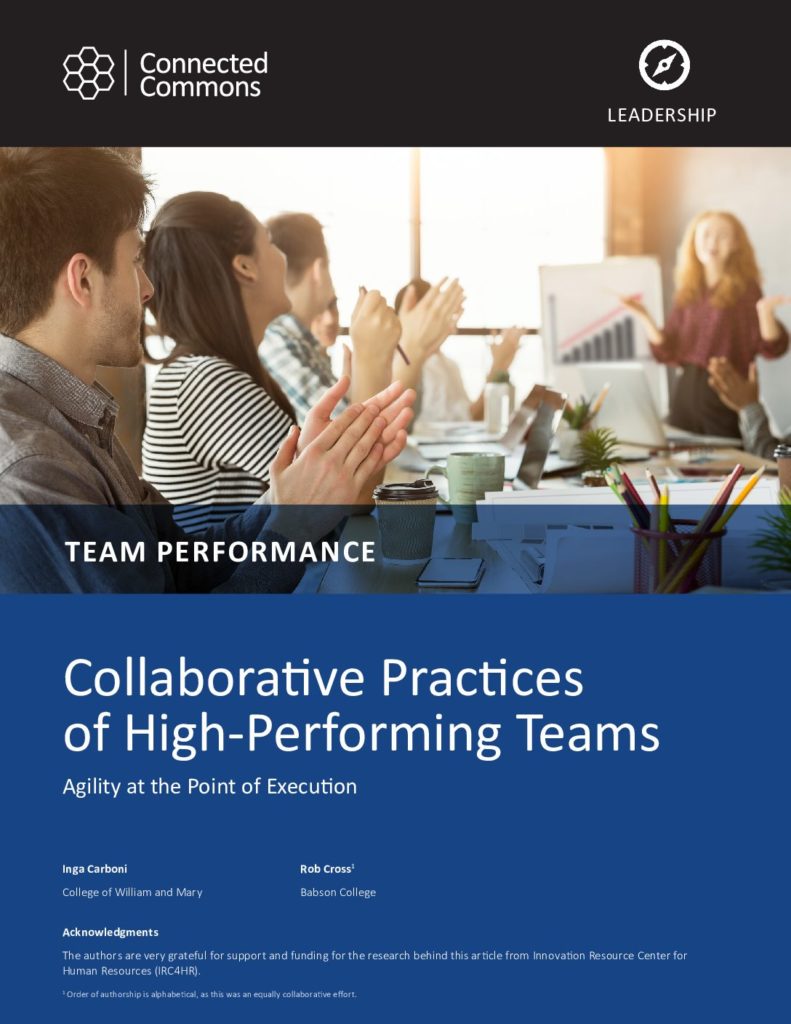About this IRC® + IRC4HR® Project
At the start of this study in 2019 – and in the past decade – it was already understood that cross-functional teams and networks are the primary source of innovation and the way that work gets done in most organizations. Yet, cross-functional groups continue to bump up against conflicting incentives, hierarchical decision-making, cultural rigidities, a lack of trust, and other obstacles that cause progress to stall or action to not be taken at all.
More recently, the challenge of leading teams and networks has become even more complex as many more of these teams are operating in distributed environments, if not completely virtual.
Rob Cross’ previous research into high-performing teams and networks demonstrated that success comes from mid-tier leaders who create the right conditions for collaboration, irrespective of organizational design or culture. What remained unknown is how, specifically, these leaders accomplish this work, often in the face of significant work demands and misaligned organizational context.
To answer this question, Rob Cross and his research partner, Inga Carboni, interviewed 100 project leaders across twenty (20) world-class organizations to better understand:
(1) the collaborative practices that enable these leaders to promote healthy network patterns critical to project success and avoid excessive collaboration friction that derails efforts and
(2) the context these leaders create – through leadership principles, talent processes, use of collaborative tools, etc. – that enables productive collaboration to emerge.
Two papers emerged from the research.
In the paper called, “Collaborative Practices of High-Performing Teams”, three broad drivers of network success are identified:
- Network management: Cultivating effective network structures; replicating patterns of high performance
- Relational Enablers: Facilitating the creation of high-quality relationships; speeding development of effective connections
- Collaborative Context: Shaping the team’s ecosystem; developing a holistic set of external relationships for success
The paper also includes a detailed set of actionable practices that are designed to improve team and network performance in your own organization.
Just as there are network patterns of high performance, the study found that there are also specific network patterns that derail or undermine team success. In the paper on the “The Six Dysfunctions of Collaborative Work”, these patterns are illustrated and defined, with instructions on how to diagnose and remedy them.
We are excited to share the results of this important research and confident that you will find the content of these reports insightful and practical. You can download them below. To stay informed about this and other studies funded by IRC4HR, please contact us.
Researchers
Rob Cross

Rob is the Edward A. Madden Professor of Global Business at Babson College and Director of the Connected Commons, a consortium of companies dedicated to developing the research, relationships, and resources that enable individuals and organizations to thrive in the Connected Economy. For almost twenty years, Rob’s research, teaching, and consulting have focused on applying social network analysis to critical business issues for actionable insights and bottom-line results. He has worked with more than 300 leading organizations (companies, government agencies, and non-profit organizations) on a variety of solutions including innovation, organizational change and alignment, talent optimization, and leadership effectiveness.
Below are two papers that present the findings and insights from the research funded by IRC4HR. To learn more about Rob’s research and his network of practitioners that are co-creating new applications of his methods and tools, please visit his website at https://www.robcross.org/ or the website of the Connected Commons at https://connectedcommons.com/.
Inga Carboni

Inga is an Associate Professor at William & Mary College. She is an award-winning instructor, author of numerous journal publications, and a 2015 recipient of a Fulbright Teaching and Scholar grant. Professor Carboni’s expertise and research interests involve networks and networking, diversity and inclusion, building and managing relationships, and leadership. Her current research focuses on gender differences in networks and networking, and the impact of those differences on individuals and organizations.
IRC® + IRC4HR® Project Publications and Learning Materials
White Paper
Collaborative Practices of High-Performing Teams

The Six Dysfunctions of Collaborative Work

IRC® + IRC4HR® Upcoming Webinars and Studies
Contact us to be notified of upcoming research by Rob and other IRC4HR grantees.
